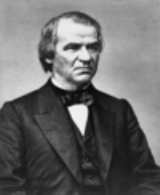
(1865–1869). As Vice-President of the United States in 1865, he succeeded Abraham Lincoln following the latter's assassination
. Johnson then presided over the initial and contentious Reconstruction era of the United States following the American Civil War
. Johnson's reconstruction policies failed to promote the rights of the Freedmen, and he came under vigorous political attack from Republicans
, ending in his impeachment by the U.S.
There are no good laws but such as repeal other laws.![]()
No, gentlemen, if I am to be shot at, I want no man to be in the way of the bullet.![]()
I have lived among negroes, all my life, and I am for this Government with slavery under the Constitution as it is. I am for the Government of my fathers with negroes, I am for it without negroes. Before I would see this Government destroyed, I would send every negro back to Africa, disintegrated and blotted out of space. ![]()
I am a-goin' for to tell you here to-day; yes, I'm a-goin for to tell you all, that I'm a plebian! I glory in it; I am a plebian! The people — yes, the people of the United States have made me what I am; and I am a-goin' for to tell you here to-day — yes, to-day, in this place — that the people are everything.![]()
Notwithstanding a mendacious press; notwithstanding a subsidized gang of hirelings who have not ceased to traduce me, I have discharged all my official duties and fulfilled my pledges. And I say here tonight that if my predecessor had lived, the vials of wrath would have poured out upon him.![]()
I have had a son killed, a son-in-law die during the last battle of Nashville, another son has thrown himself away, a second son-in-law is in no better condition, I think I have had sorrow enough without having my bank account examined by a Committee of Congress.![]()
Legislation can neither be wise nor just which seeks the welfare of a single interest at the expense and to the injury of many and varied interests at least equally important and equally deserving the considerations of Congress.![]()
The goal to strive for is a poor government but a rich people.![]()

